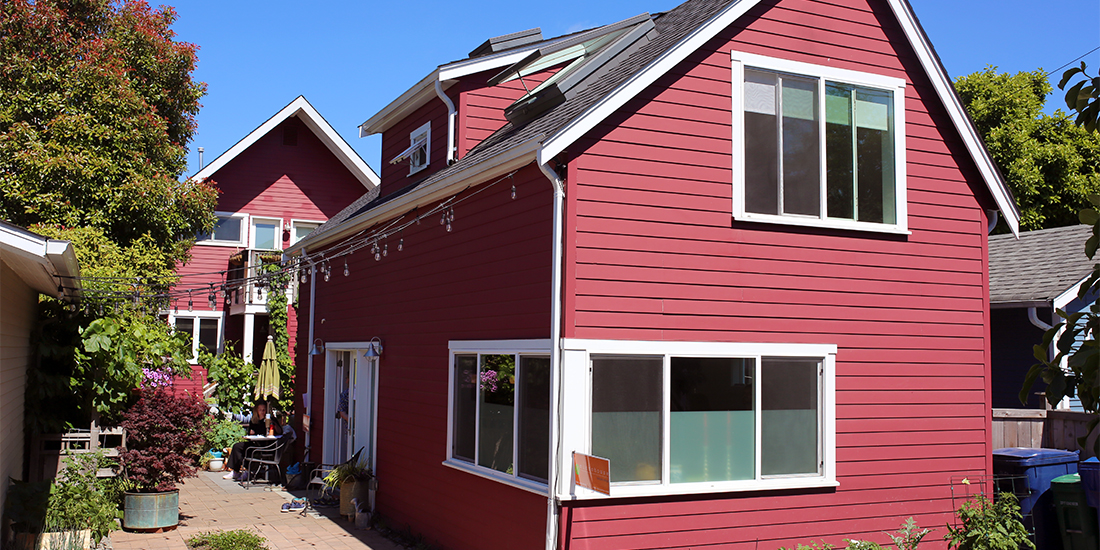
Q: I’ve read recently that Seattle has made it easier to build ADUs. My partner and I think this may be a great opportunity to rent out space in our backyard for some extra income, but we don’t know all the ins and outs. What do we need to know before we start?
A: If you’re looking for extra rental income or a private space for out-of-town guests or aging parents, accessory dwelling units (ADUs) are a great option. ADUs—an umbrella term for mother-in-law suites and backyard cottages—are additional residences built on the same property as an existing single-family home. Detached accessory dwelling units (DADUs) are simply ADUs detached from the main house.
Both ADUs and DADUs generally include living rooms, bedrooms, kitchens, bathrooms, and their own entrances. They’re common on the east coast and in populous Midwestern cities such as Chicago, but have been slow to take root in Seattle—until now. On July 1, the Seattle City Council voted unanimously to make it easier for homeowners to permit and build ADUs. Many believe this will lead to more affordable housing options and additional income for homeowners interested in renting out space.
The rule changes have been fiercely debated, but most Seattleites and City Councilmembers agree that easing restrictions will increase housing options and affordability. If you own a single-family home, building an ADU can bolster the city’s housing supply while creating a multi-purpose space on your own property. The new legislation will take effect 30 days after Mayor Durkan signs her approval.
So, what do the new ADU rules mean for Seattle homeowners?
The old rules required homeowners in single-family zones to live onsite, preventing DADUs from being built on rental properties and making it impossible for homeowners to move out and keep their home and ADU as two rental properties. They also required an off-street parking spot for each ADU, so homeowners sans off-street parking could not rent out ADUs. None of these rules apply anymore. Size restrictions have also been eased to allow larger, taller DADUs, making them easier to design and build.
With the end of these restrictions, this is a great time to jump into the exciting world of ADUs! Perhaps the best part about them is the tremendous flexibility they offer. They can be a home office one year and a rental apartment the next. They can house your grown children or your parents. The choice of how you design or use them is all yours.
Your finished basement or attic can easily be converted into a mother-in-law suite by adding a kitchenette. Your overgrown backyard can become a residence for college students or retirees interested in tiny home living. If you’re looking to downsize yourself, you could move into your new DADU and rent the main house out. The best part is you can design these spaces to blend in with the style of your current home or give them colorful personalities of their own.
Whether you’re building out an existing structure or creating a new space from scratch, working with an experienced designer and builder is highly recommended. Permits and building codes must be met and designing small spaces isn’t always as easy as it looks. More planning means more personalization and a smarter layout. There are plenty of ADU advocates across the city who have been designing, building, and championing these alternative housing types for years. They’re your best bet for success and, as you can guess, they’re already getting inundated with phone calls from eager homeowners.
If an ADU sounds like a good fit for your property, have a professional visit your site and lay out your options. The number of ADUs is expected to rise exponentially in the next few years and your home could be a contender for one of these highly sought-out spaces.
Jason Legat is founder and president of Model Remodel, a member of the Master Builders Association of King and Snohomish Counties (MBAKS). If you have a home improvement, remodeling, or residential homebuilding question you’d like answered by one of MBAKS’ nearly 2,800 members, write to homework@mbaks.com.